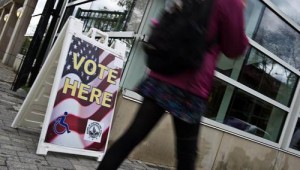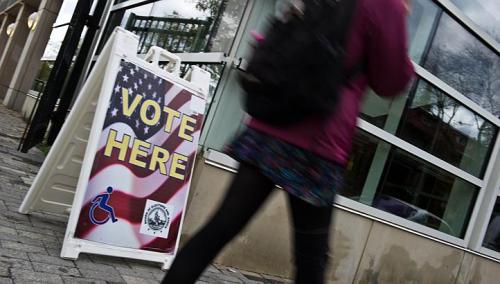By Mira Oberman (AFP)

Chicago — With the tight White House race headed for what could be a photo finish Tuesday, analysts warn the United States could once again be forced to wait weeks to find out who is going to be president.
“This could be another election that’s decided by judges,” warned Paul Sracic, chair of the political science department at Youngstown State University in Ohio.
President Barack Obama and Republican rival Mitt Romney need to capture at least 270 electoral votes in order to win the White House.
While recent polls show Obama has the advantage in most battleground states, his lead is narrow and polls don’t always get it right. If a victory for either candidate ends up hinging on a single state it will likely be Ohio.
The Supreme Court ended up deciding the results of the 2000 election when Democrat Al Gore won the popular vote but George W Bush won the electoral college with such a narrow margin in Florida that it sparked a recount and massive legal battle over the infamous ‘hanging chads.’
Four years later, Bush won a second term after less than 119,000 votes in Ohio gave him a narrow electoral college advantage.
The problem this year is that there could easily be that many provisional ballots cast in Ohio, where state law prohibits officials from starting to count them until 10 days after the election.
About 200,000 of the more than 1.3 million absentee ballots mailed have not yet been returned, the Ohio secretary of state’s office said Saturday.
“If it’s too close to call in Ohio on election night that’s a good indication it’s going to be a few weeks at least,” said Rick Hasen, an electoral law expert at University of California, Irvine and author of The Voting Wars.
“It’s going to be fought ballot by ballot if it goes into overtime.”
In an effort to avoid the mess of 2004, when thousands of voters waited hours in the cold to cast their ballots, Ohio election officials sent absentee ballot applications to every registered voter in the state.
The aim was to cut down on lines and make it as easy as possible for people to vote: they can pop the early ballot in the mail, drop it in a box at a polling station or just walk into a polling station and request an early ballot.
But if someone applies for an absentee ballot and then decides to vote on election day, and experts think plenty of people will, then they will be required to cast provisional ballots that are sealed in an envelope until it can be proven they haven’t already voted.
Provisional ballots are also cast if a voter forgot to register a change of address, doesn’t appear on the rolls, can’t provide proper identification, was flagged because registered mail failed to be delivered to the address on file, or is challenged by an electoral observer.
Further complicating the count are the mail-in ballots, which can arrive as late as 16 November so long as they are post-marked by Monday.
And of course if the results are within 0.5 percentage points, an automatic recount of all ballots is triggered.
The campaigns have already assembled an army of lawyers prepared to fight it out if any of those scenarios play out. But they won’t even be able to look at the notes written on the envelopes holding the provisional ballots until 17 November.
“The good thing is, if all goes as hoped, Ohio has some pretty good laws and regulations in place on actual election day practices,” said Nick Worner, a spokesman for the American Civil Liberties Union’s Ohio branch.
“The partisan voter observers who are putting up signs and stuff in polling stations in other states, in Ohio they’re not allowed to go inside, they’re not allowed within 100 feet.”
The state has also implemented strict standards to ensure that its 88 county election boards use reliable voting machines and report their initial count in a timely, electronic manner.
But since they don’t have to tally the number of provisional ballots cast in their precincts until their final report election night could end up being a really long one.
“Historically it’s going to be pretty late at night, early into the morning before you’re going to see those final reports,” Maggie Ostrowski, communications director for Ohio’s secretary of state, told AFP.
“It’s going to depend on how close the race is whether we’re all biting our nails.”



